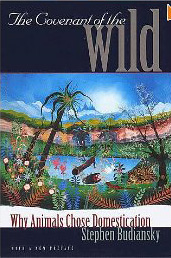The Covenant of the Wild: Why Animals Chose Domestication
By Stephen Budiansky
I was a vegetarian for a decade or so. And then I started reading about farmers; farmers who worked from sun-up to sun-down feeding, caring for, and seeing to the needs of their animals. Farmers who were confronted everyday with the circle of life. Farmers who had long ago accepted the truth that to be alive, something else, be it plant or animal, must stop living. So when I read Budiansky’s The Covenant of the Wild, I felt that I had finally found an author who was able to articulate all of the things I had been feeling about our complex relationships with animals.
Did humans domesticate animals to make us feel better and to have companionship? Did we domesticate them to mistreat, abuse, and use them as a food source? Here’s the question that Budiansky poses: did humans domesticate anything or anyone at all? What if the art of domestication was actually an evolutionary strategy that living things have developed purely for the success of the species? What if animals figured out that to align themselves with human beings’ lives might be their best shot at success? I know my house cats have a delightful life of napping and bird watching (and domesticated cats as a whole reproduce prolifically) while I toil away every day to make enough money to feed them.
Henry David Thoreau may have said it best himself in his most famous book, Walden, “I am wont to think that men are not so much the keepers of herds as herds are the keepers of men, the former are so much the freer.”
Budiansky puts not just the relationships between people and animals into a new perspective, but our whole notion of what “nature” is and what our role in this whole game of life is and perhaps should be.
Join us to discuss this book and at our next Nature’s Narratives Book Discussion Group on Wednesday, November 14th at 5:30 in the Wister Center.






No Comments